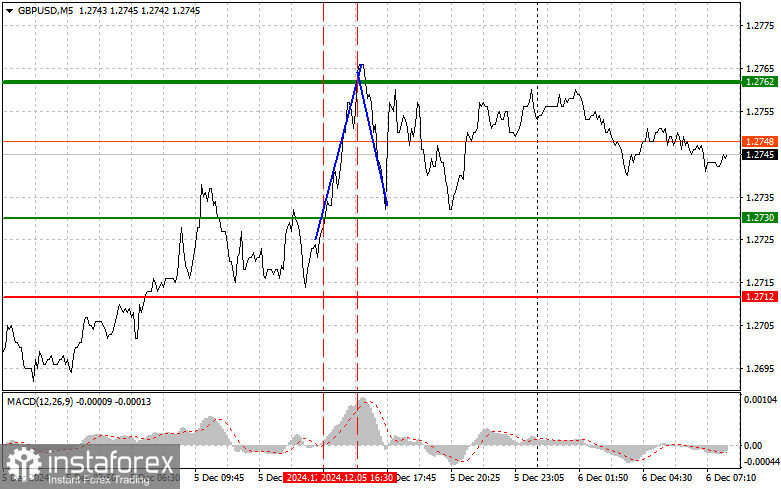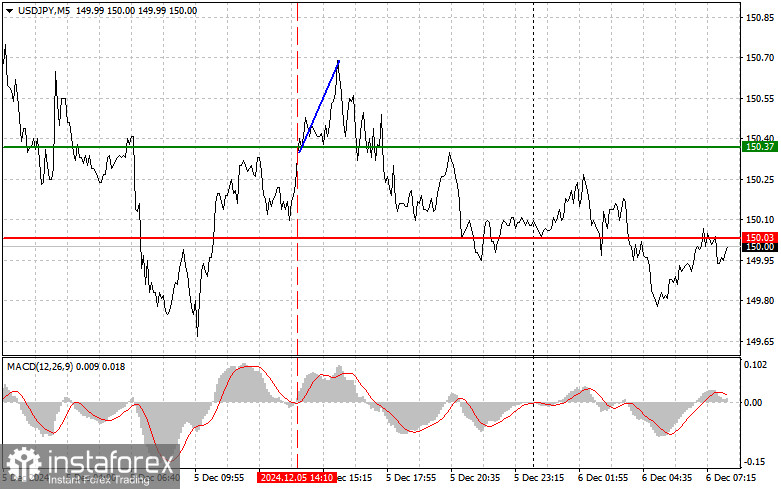Analysis of Trades and Trading Recommendations for the British Pound
The test of the 1.2730 level coincided with the moment when the MACD indicator was just beginning its upward movement from the zero mark, confirming a valid entry point for buying the pound. As a result, the pair rose by 30 pips, reaching the target level of 1.2762. Selling on the rebound from this level brought an additional 20 pips of profit.
The British pound is demonstrating stable growth amid skepticism about the U.S. dollar, which is facing uncertainty in monetary policy. Traders are increasingly focusing on upcoming decisions by the Federal Reserve, anticipating that a reduction in interest rates will contribute to further dollar weakening. This creates favorable conditions for GBP/USD buyers, who are actively increasing their market positions. Technical analysis also supports bullish sentiment. The GBP/USD pair has broken through several key resistance levels, opening additional opportunities for growth.
Today's release of the Halifax House Price Index in the UK is unlikely to serve as a definitive indicator of stability in the British housing market. Rising house prices may indicate increased demand, but they do not always reflect the broader economic picture. However, when considering buying opportunities in the event of positive data, keep in mind that important U.S. labor market data will be released later in the day. This could quickly overshadow the pound's upward prospects. For intraday trading, I will primarily focus on the implementation of Scenario #1 and Scenario #2.

Buy Scenarios
Scenario 1:
I plan to buy the pound today upon reaching the entry point near 1.2756 (green line on the chart), with the target of rising to 1.2793 (thicker green line on the chart). Around 1.2793, I plan to exit purchases and open short positions in anticipation of a 30-35 pip downward movement from the level. Expecting the pound to rise today is contingent on positive data.
Important: Before buying, ensure that the MACD indicator is above the zero mark and beginning to move upward.
Scenario 2:
Plan to buy the pound today if there are two consecutive tests of the 1.2735 level when the MACD indicator is in the oversold area. This will limit the pair's downward potential and likely trigger an upward market reversal. Growth can be expected to the opposite levels of 1.2756 and 1.2793.
Sell Scenarios
Scenario 1:
Plan to sell the pound today after breaking through the 1.2735 level (red line on the chart), which will likely lead to a rapid decline in the pair. The key target for sellers will be the 1.2704 level, where I plan to exit short positions and immediately open buy positions in anticipation of a 20-25 pip upward movement from the level. Selling the pound is best done from higher levels.
Important: Before selling, ensure that the MACD indicator is below the zero mark and just beginning its downward movement.
Scenario 2:
Plan to sell the pound today if there are two consecutive tests of the 1.2756 level when the MACD indicator is in the overbought area. This will limit the pair's upward potential and likely trigger a market reversal downward. Declines can be expected to the opposite levels of 1.2735 and 1.2704.

Chart Notes
- Thin green line: Entry price for buying the trading instrument.
- Thick green line: A suggested target for Take Profit or manually locking in profits, as further growth above this level is unlikely.
- Thin red line: Entry price for selling the trading instrument.
- Thick red line: A suggested target for Take Profit or manually locking in profits, as further decline below this level is unlikely.
- MACD Indicator: Critical for identifying overbought and oversold zones to guide market entry decisions.
Important Note for Beginner Traders
- Always approach market entry decisions cautiously.
- Avoid trading during major news releases to sidestep volatile price swings.
- If trading during news releases, always set stop-loss orders to minimize losses.
- Trading without stop-loss orders or money management practices can quickly deplete your deposit, especially when using large volumes.





















